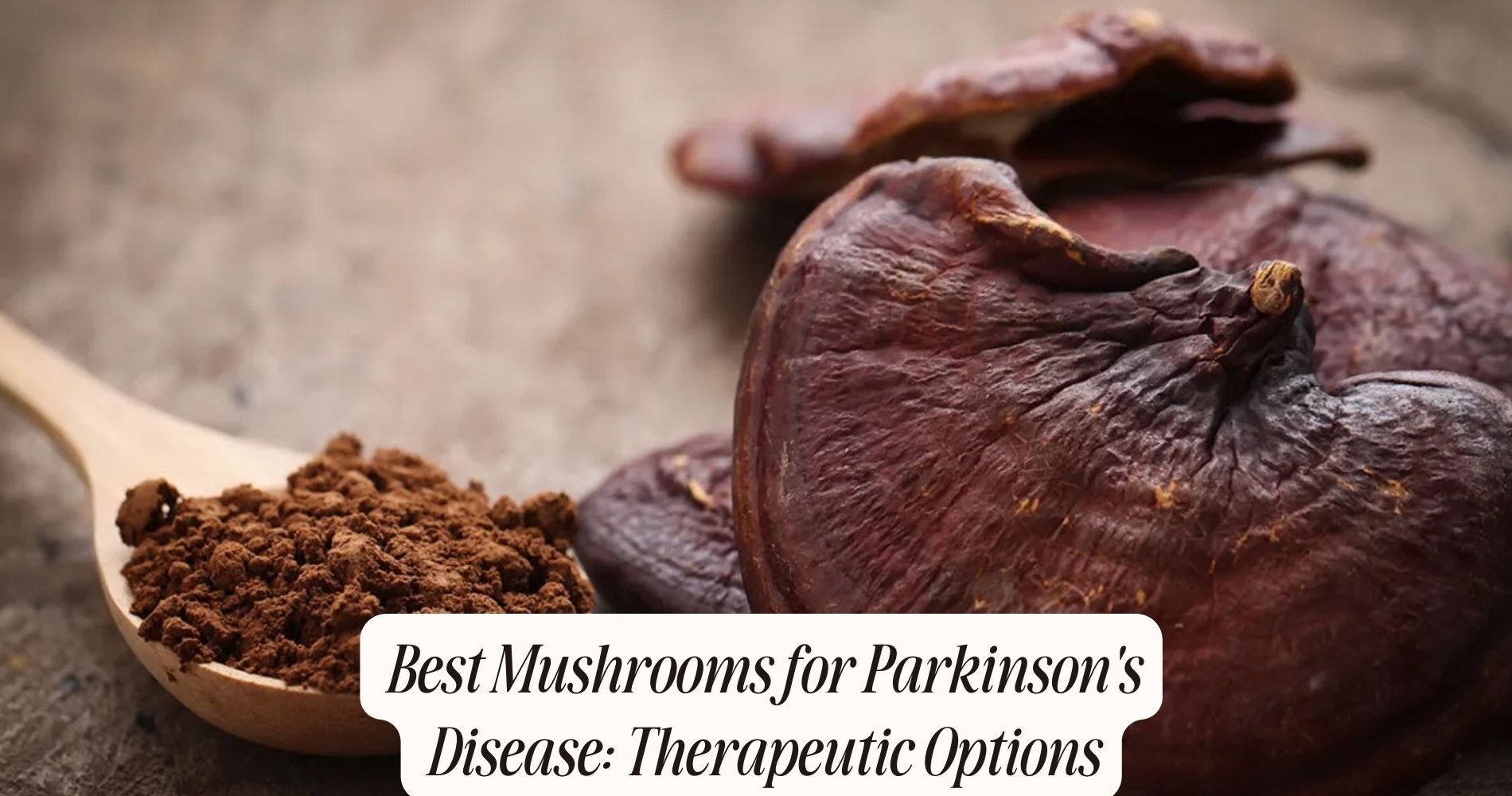
Best Mushrooms for Parkinson's Disease: Therapeutic Options
Lion's Mane
Lion's Mane, known scientifically as Hericium erinaceus, has shown important neuroprotective effects that may benefit individuals with Parkinson's disease. You might find it promising to know that Lion's Mane contains bioactive compounds such as hericenones and erinacines, which have demonstrated cognitive enhancement capabilities. These compounds promote the synthesis of nerve growth factor (NGF), a critical protein for the maintenance and survival of neurons. By supporting neuronal health, Lion's Mane may help mitigate some cognitive decline associated with Parkinson's.

Moreover, you'd be interested to learn about the antioxidant properties of Lion's Mane. Oxidative stress is a significant contributor to neuronal damage in Parkinson's disease. Lion's Mane exhibits strong antioxidant activity, which can neutralize free radicals and reduce oxidative stress. This function is important for protecting dopaminergic neurons, the cells most affected in Parkinson's.
Clinical studies and animal models have shown that Lion's Mane might improve memory and cognitive function. This is particularly relevant given that cognitive impairment often accompanies Parkinson's. By incorporating Lion's Mane into your dietary regimen, you could potentially enhance cognitive function and protect neuronal health.
Always consult your healthcare provider before starting any new supplement.
Reishi
Among the beneficial mushrooms for Parkinson's disease, Reishi (Ganoderma lucidum) stands out due to its potent neuroprotective and anti-inflammatory properties. Research indicates that Reishi can mitigate neurodegenerative processes by inhibiting oxidative stress and reducing inflammation, which are essential factors in Parkinson's pathology. Its bioactive compounds, such as triterpenoids and polysaccharides, play integral roles in these mechanisms.
You'll find that Reishi's anti-inflammatory properties are particularly significant. Chronic inflammation exacerbates neuronal damage in Parkinson's disease. Reishi's ability to modulate inflammatory pathways and decrease pro-inflammatory cytokines could potentially slow disease progression. According to studies, Reishi extracts have shown efficacy in reducing markers of inflammation in the brain, thereby offering a neuroprotective effect.

Additionally, Reishi provides substantial immune support, which is crucial for patients with Parkinson's disease. The mushroom's polysaccharides enhance immune response by activating macrophages and natural killer cells. This immune modulation not only helps in combating infections but also contributes to overall health maintenance, which is often compromised in neurodegenerative conditions.
Cordyceps
Shifting focus to Cordyceps, this mushroom exhibits remarkable neuroprotective and antioxidative properties that are highly beneficial for managing Parkinson's disease. Studies have shown that Cordyceps helps in reducing oxidative stress by scavenging free radicals, which can mitigate neuronal damage that's characteristic of Parkinson's. This antioxidative effect is essential because oxidative stress is a major contributor to the progression of neurodegenerative diseases.
Moreover, Cordyceps is known for its energy-boosting capabilities, which can be particularly advantageous for Parkinson's patients experiencing fatigue and reduced vitality. The bioactive compounds in Cordyceps, such as cordycepin, enhance mitochondrial function, thereby increasing cellular energy production. This energy boost can greatly improve daily functioning and overall quality of life.

Additionally, Cordyceps has been traditionally used to enhance athletic performance by improving oxygen utilization and blood flow. For Parkinson's patients, improved blood flow and oxygenation can contribute to better motor function and reduced symptoms. Clinical evidence suggests that Cordyceps supplementation may help in maintaining muscle strength and coordination, which are often compromised in Parkinson's disease.
Chaga
Importantly, Chaga mushroom is renowned for its potent anti-inflammatory and immunomodulating properties, making it a valuable addition to the therapeutic regimen for managing Parkinson's disease. Chaga, scientifically known as Inonotus obliquus, is a parasitic fungus that grows mainly on birch trees. Its role in immune support comes from its ability to modulate the body's immune response, potentially reducing neuroinflammation, a significant factor in Parkinson's disease pathology.
Chaga is rich in antioxidants, particularly superoxide dismutase (SOD), which neutralizes free radicals, thereby protecting neuronal cells from oxidative stress. Oxidative stress has been implicated in the degeneration of dopaminergic neurons in Parkinson's disease, making Chaga's antioxidant properties particularly beneficial. Additionally, Chaga contains betulinic acid, which has shown potential neuroprotective effects in preclinical studies.

Research indicates that Chaga's polysaccharides enhance the immune system by stimulating the production of cytokines, which play an important role in combating neuroinflammation. Additionally, its betulin and inotodiol components have exhibited anti-inflammatory effects, further contributing to the reduction of neuroinflammatory processes.
Incorporating Chaga into your therapeutic regimen could offer substantial neuroprotective benefits through its combined anti-inflammatory and antioxidant properties, thereby potentially mitigating the progression of Parkinson's disease symptoms.
Turkey Tail
Turkey Tail mushroom, scientifically known as Trametes versicolor, is recognized for its potent immunomodulatory and antioxidant properties that may offer therapeutic benefits for managing Parkinson's disease. Research indicates that this mushroom contains polysaccharopeptides like PSP and PSK, which enhance immune support by modulating the activity of immune cells. This immune regulation is essential for Parkinson's patients, where neuroinflammation plays a significant role in disease progression.
In addition to immune support, Turkey Tail's antioxidant properties help mitigate oxidative stress, a key factor in neurodegeneration associated with Parkinson's. By scavenging free radicals, Turkey Tail may protect dopaminergic neurons, potentially slowing disease progression.

Moreover, Turkey Tail has a well-documented history in cancer treatment. Its use as an adjunct therapy in oncology demonstrates its safety and efficacy in boosting the immune system, which can be particularly beneficial for Parkinson's patients with weakened immune responses.
Clinical studies have also shown that Turkey Tail can improve gut health, indirectly benefiting neurological conditions. While more research is needed to fully understand its impact on Parkinson's, the existing evidence suggests that incorporating Turkey Tail into your therapeutic regimen could offer multifaceted benefits.
Enhance Your Wellness with Well Gummies' SUPER MUSHROOM GUMMIES
While exploring the best mushrooms for Parkinson's, consider integrating Well Gummies' SUPER MUSHROOM GUMMIES into your daily health regimen. These gummies make incorporating medicinal mushrooms effortless and enjoyable, containing a blend of 10 functional mushrooms, including those beneficial for neurological health. Perfect for those seeking natural ways to fuel their brain and energize their body, these vegan gummies offer calmer energy, sharper focus, and immune support, contributing to a balanced body and clear mind. Plus, they come in a delicious wild berry flavor, as tasty as your favorite candy but without any jitters or crash. Make SUPER MUSHROOM GUMMIES a delightful and healthful part of your day.
Frequently Asked Questions
How Do Mushrooms Help Alleviate Symptoms of Parkinson's Disease?
You can alleviate Parkinson's symptoms with mushrooms due to their neuroprotective properties and antioxidant effects. These compounds help protect neurons and reduce oxidative stress, essential for managing the disease's progression and symptom severity.
Are There Any Side Effects of Using Mushrooms for Parkinson's Disease?
Yes, there are side effects of using mushrooms for Parkinson's disease. Potential allergies can occur, and digestive issues like nausea or diarrhea might arise. Always consult your healthcare provider before adding mushrooms to your treatment plan.
Can Mushrooms Be Used Alongside Conventional Parkinson's Medications?
You can use mushrooms as complementary therapies alongside conventional Parkinson's medications. Patient experiences suggest potential benefits, but always consult your neurologist to confirm there's no interaction and to tailor the treatment plan appropriately.
What Is the Recommended Dosage of Mushrooms for Parkinson's Patients?
You're likely wondering about the recommended dosage for Parkinson's patients. Clinical studies suggest starting with 1-2 grams of dried mushroom in capsule dosage forms. Administration methods typically include oral ingestion for consistent therapeutic effect.
Are There Any Clinical Studies Supporting Mushrooms' Efficacy for Parkinson's?
You're asking if there are any clinical studies supporting mushrooms' efficacy for Parkinson's. Current clinical trials are limited, but preclinical studies show promising neuroprotective effects. More extensive research is needed to confirm these findings in human subjects.
Conclusion
To sum up, incorporating mushrooms like Lion's Mane, Reishi, Cordyceps, Chaga, and Turkey Tail into your therapeutic regimen can offer neuroprotective benefits for Parkinson's disease.
These fungi possess bioactive compounds that may enhance brain function, reduce oxidative stress, and modulate the immune system.
While clinical trials are still ongoing, preliminary evidence suggests they could be a valuable adjunct to conventional treatments.
Always consult your healthcare provider before making any changes to your treatment plan.




